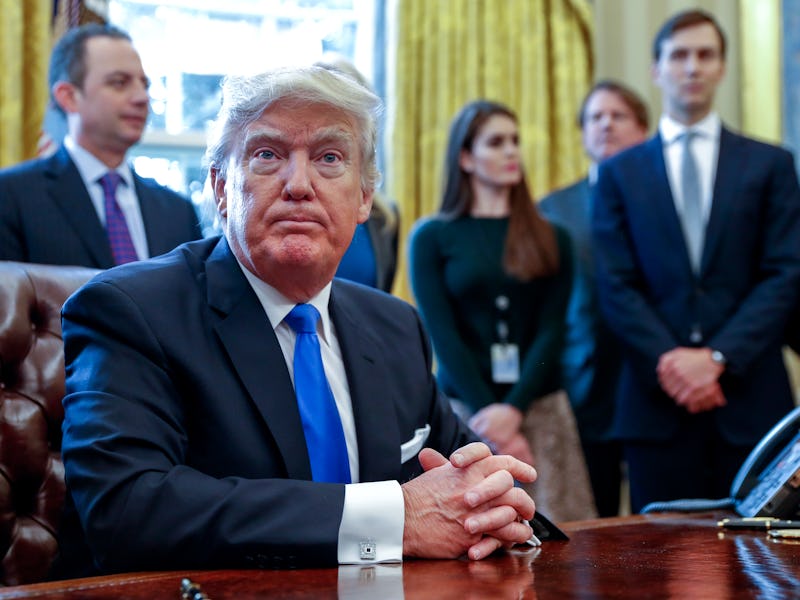Trump's War on the EPA Is Right-Wing Canadian Fan Fic
Stephen Harper hated regulation too and that did not end well.

President Donald Trump has ordered the Environmental Protection Agency to put its contract and grant programs on indefinite hold and instructed staff not to speak publicly about the move, according to several news reports.
These EPA contracts pay for research, environmental remediation, and monitoring, representing core operations of the agency. The EPA awarded about $11 billion in contracts and grants in 2013. It’s unclear the extent to which ongoing contracts will be impacted, or how long the freeze will last. Trump’s pick to lead the EPA, Scott Pruitt, has yet to be confirmed by the Senate.
The move may seem unprecedented, but if American onlookers want to glimpse the future of environmental science under Trump, they can look north to Canada, which has only just emerged from a scientific Dark Age of its own.
Back in 2013, Canadian scientists gathered on the lawn of Parliament Hill, many holding signs and dressed in lab coats, to protest the actions of then-Prime Minister Stephen Harper to defund science and silence federal scientists. It was an odd sight — Canadian scientists as a group are not known for causing a ruckus. But tensions, simmering for years, had boiled over.
It’s hard to overstate the real impact the Harper government had on Canadian science: Thousands of jobs were cut; libraries were shuttered, haphazardly and with little notice; an unknown volume of archival data was lost forever. Scientists could no longer speak to the media about their research. Journalists received responses in the form of pre-approved talking points emailed through communications officials — if they got any at all.
That last point — on the muzzling of scientists and public officials — resonates strongly in America today. EPA staff have been notified that no public communications will be permitted: no news releases, no social media, and no speaking with journalists without careful vetting ahead of time. A similar gag order has been issued to scientists and staff with the U.S. Department of Agriculture’s Agricultural Research Service. The EPA’s most recent news release, issued Friday, notified residents of the Yakama Nation in Washington State of an ongoing outdoor fire ban due to low air quality in the area. This is the sort of information that will no longer be released to the public.
What happens if oil spills in inland federal waters, the jurisdiction of the EPA? How will officials get the word out to the public, given that they’ve been barred from all external communication? Will they have the authority required to immediately make orders for emergency clean-up action, given that this will almost certainly require hiring outside contractors? Who, exactly, will be in charge?
The EPA and the USDA — which also saw its research grant funding frozen — did not respond to requests for comment on this story.
It wouldn’t be entirely accurate to suggest that the Trump administration has declared a war on science this week. These actions are not about attacking science in general, but clearly separating friend from foe and silencing the latter. It’s not scientists in general that worry about Trump and his leadership, only those who suggest that unbridled industrial capitalism has unintended negative consequences for human and environmental health.
That’s why the Trump administration needed the list of Department of Energy staff who had attended climate change meetings — it’s a crude measure for those in the agency who might not fully back Trump’s goals of unrestrained fossil fuel industry expansion.
While Canadian scientists were caught somewhat off guard by the insidious creep of scientific suffocation, American scientists were not, and won’t be. Since Trump’s election in November, the alarm bells have been ringing. American scientists are working with Canadian counterparts and others to back up key databases, particularly on climate change.
Trump’s power to do real harm is enormous, but resistance is possible. The DOE successfully rejected Trump’s request for names of staff who had worked on climate change issues — though, admittedly, he was not yet president at the time.
Just days into his administration, Trump has already pushed the bar well past the suppression of data and evidence and into the promotion of verifiably false “alternative facts.” This is dangerous territory, and Americans will have to look farther afield than Canada to understand how this tactic will play out.
“Obvious lies serve a purpose for an administration,” tweeted Russian dissident and chess grandmaster Garry Kasparov on Saturday. “They watch who challenges them and who loyally repeats them. The people must watch, too.”